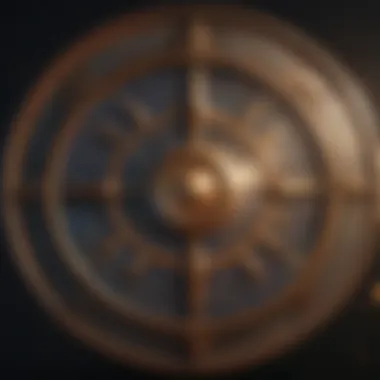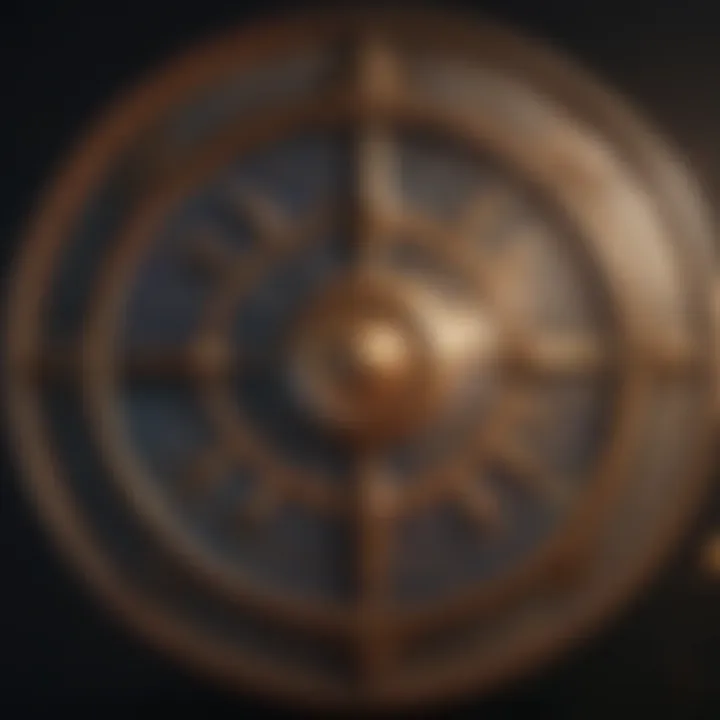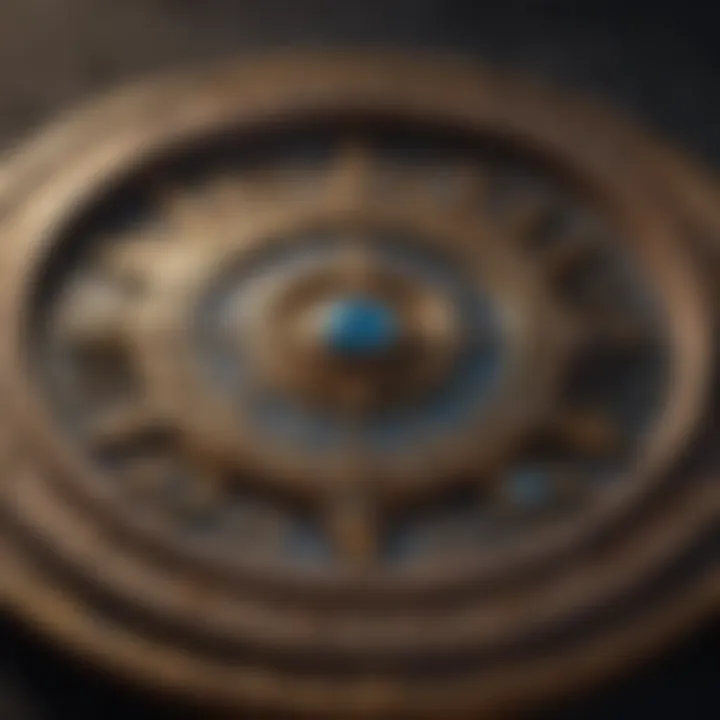Discovering the Depths of Personal Horoscopes


Intro
In the enigmatic world of astrology, personal horoscopes emerge as fascinating tools for understanding ourselves and others. They offer a unique lens through which we can examine our personality traits, relationships, and even predict future occurrences based on celestial movements. Many astrology enthusiasts find themselves drawn into this intricate tapestry, compelled by the insights these horoscopes provide.
As you journey through this guide, you'll discover that personal horoscopes are not merely whimsical interpretations but rather structured analyses influenced by the stars. The joy lies in realizing how these astrological readings can enhance our self-awareness and interpersonal connections while also recognizing their limitations and the importance of a balanced approach in their use.
Let’s embark on this exploration, beginning with a deeper insight into the Zodiac profiles, which serve as the foundation for creating personal horoscopes.
Understanding Personal Horoscopes
Personal horoscopes have captivated the human imagination for ages. They serve as guides, illuminating the paths we tread and the decisions we make on a daily basis. In this exploration of personal horoscopes, we will uncover their essence, significance, and the multifaceted layers that define them.
One of the first considerations when discussing horoscopes lies in their definitions. Essentially, these are astrological tools mapped from the positions of celestial bodies at the time of an individual's birth. Unlike generic forecasts, personal horoscopes delve deeper into nuances, offering a unique perspective tailored to each individual.
Definition of Personal Horoscopes
So, what exactly is a personal horoscope? In simplest terms, it's a celestial snapshot reflecting your unique astrological make-up. This isn't just a random collection of star signs and planetary alignments; it's a complex interplay of various astrological elements, such as the positions of the Sun, Moon, and ascendant. Each of these components contributes to the broader picture that defines an individual's personality, motivations, and potential life events.
To put it another way, think of your personal horoscope as a cosmic personalized roadmap. The intricate map reveals not only where you've been but also hints at where you might be going—navigating through life can feel more manageable when armed with this perspective. The beauty is in its individuality; no two horoscopes are equivalent, reflecting the depth of astrological study.
The Historical Context of Astrology
Astrology isn't a new-age fad; rather, it boasts roots that stretch back thousands of years. The foundations of astrology can be traced to ancient civilizations like the Babylonians who first began documenting celestial occurrences around the 2nd millennium BCE. These early astrologers observed the heavens and connected the dots between planetary movements and earthly events. They believed that celestial bodies influenced not only natural phenomena but also human affairs.
In ancient Greece, thinkers like Ptolemy further advanced astrological principles, merging philosophical and astronomical insights. His work became a cornerstone for much of Western astrology, establishing theories that resonate even today. Likewise, Asian cultures had their own systems, intertwining astrology with their spiritual practices and traditions.
The historical significance of astrology underscores how deeply ingrained the practice is in cultures worldwide. While some skeptics raise eyebrows at its scientific validity, many continue to embrace it as a tool for introspection and guidance. The intricate web of beliefs surrounding personal horoscopes has evolved but never truly faded away.
"Astrology is a language. If you understand this language, the sky speaks to you." – Dane Rudhyar
In sum, understanding personal horoscopes provides not only insights into self-discovery but also a connection to humanity's past engagements with the cosmos. Recognizing the blend of historical context and present relevance fosters a richer appreciation of how horoscopes impact our lives today. As we move forward, the exploration of astrological mechanics and interpretations will further enhance our understanding of this timeless practice.
The Mechanics Behind Horoscopes
Understanding the mechanics that underpin horoscopes is like diving into the gears of an intricate watch. Each mechanism serves a specific purpose, weaving together the fabric of astrological insights that many seek. In this section, we will unravel the processes involved in creating personal horoscopes, focusing particularly on the astrological calculations and birth charts that provide a framework for reading the stars.
Astrological Calculations
The term 'astrological calculations' might seem technical at first glance, but at its core, it's about tracking celestial movements. The main calculation involves determining the positions of celestial bodies at the exact moment of one’s birth. This information acts like a cosmic fingerprint, guiding the interpretation of personal horoscopes.
In practical terms, astrologers rely on a few vital elements:
- Ephemeris: This is a table that chronicles the positions of celestial bodies over time. An ephemeris allows astrologers to trace the movements of planets and stars countless years into the past or future.
- Ascendant Calculation: This is fundamental for creating birth charts. The ascendant, or rising sign, indicates how the world sees an individual, shaping personal traits and behaviors.
- House Division: The sky is divided into twelve segments, known as houses, each representing different life areas—career, relationships, health, and so on. Understanding where each planet lies at one's time of birth within these houses is crucial for accurate readings.
Often, novice astrologers can get lost in the labyrinth of calculations, but even small miscalculations can lead to vastly different interpretations. Those aiming to understand their horoscopes better would do well to familiarize themselves with the basics of how these calculations come to be.
"Astrology is a language; if you understand this language, the sky speaks to you." – Dane Rudhyar
Understanding Birth Charts and Natal Charts
The birth chart, often referred to as the natal chart, is the very heart of astrological interpretation. Imagine it as a snapshot of the cosmos at one moment in time – your moment of birth. It lays out the positions of the sun, moon, and planets in relation to Earth, creating a celestial map unique only to you. Understanding this chart is essential for interpreting personal horoscopes effectively.
A natal chart is structured in a specific format:
- Zodiac Signs: Each of the twelve signs plays a role in defining personality traits and tendencies. These signs are not only about one’s sun sign but encompass the positions of the moon and rising signs as well.
- Planetary Aspects: The angles that planets make to each other in the chart reveal how different influences interact with one another. For example, a conjunction could indicate an intense relationship between two planetary energies, while a square might showcase a more conflictual relationship.
- Houses: As mentioned earlier, the chart's twelve houses provide context for how the celestial dynamics play out in various life facets. For instance, the second house relates to personal finances and values, while the seventh house governs partnerships and marriage.


Deciphering natal charts can be daunting for most, but understanding just fundamental aspects like these can greatly enhance how individuals use their horoscopes for self-reflection and growth. Each element—from signs to houses to planetary aspects—has a story to tell, encouraging one to listen closer to the cosmic messages of their personal horoscope.
Accessing Free Personal Horoscopes
Diving into the realm of personal horoscopes can seem like stepping into a spider's web—intricate and perhaps overwhelming. However, accessing free horoscopes forms a crucial part of understanding astrology without feeling financially strained. This section brings to the light the method of finding these resources and emphasizes the significance of quality over quantity when it comes to astrology content.
Where to Find Free Horoscopes
In the modern digital age, the quest for free personal horoscopes can be likened to looking for a needle in a haystack. Fortunately, plenty of resources make this task a bit easier. Various websites, apps, and online communities offer free horoscopes daily, weekly, or even monthly. Here are some notable places:
- Astrology Websites: Sites such as Astro.com and Cafe Astrology provide daily forecasts based on one’s birth chart, offering insights into sun signs, moon signs, and more.
- Mobile Apps: Applications like Co-Star and TimePassages deliver personalized horoscope notifications straight to your device, making astrology more accessible on the go.
- Social Media: Platforms such as Facebook and Reddit host vibrant communities of astrology enthusiasts who share their insights, articles, and free readings regularly. You’ll often find discussions that can lead you to hidden gems of free resources.
- E-newsletters: Signing up for newsletters on reputable astrology sites can land you daily or weekly horoscopes delivered to your inbox.
It's vital to explore these various channels to discover what resonates with you. Each source might provide unique angles and interpretations, enhancing your understanding of personal horoscopes.
Quality vs. Quantity: Choosing Reliable Sources
When it comes to personal horoscopes, seeking quality can outweigh the sheer number of options available. In this astrology jungle, distinguishing reliable sources from the fluff can be challenging but crucial.
- Research Backgrounds: Look for sites or authors with a solid foundation in astrology. Experienced astrologers often provide insights that are more accurate and tailored.
- Read Reviews: Platforms like Reddit can give you a glimpse into the effectiveness of various horoscope providers. Engaging with community feedback might help narrow down trustworthy sources.
- Trust Your Instincts: If something feels off—perhaps too generalized or inconsistently interpreted—trust that gut feeling. Not all free horoscopes provide the depth one might seek.
- Consider Credentials: Some astrologers offer personal insights based on their studies or experiences. Ensure you're reading interpretations that come from individuals who have a legitimate grasp on the subject.
In summary, while the internet floods users with options for free personal horoscopes, it doesn't mean all are treasures worth exploring. Balancing between quantity and quality is the name of the game. You want sources that not only speak to you personally but also help untangle the complexities of astrology in a meaningful way.
Interpreting Personal Horoscopes
Interpreting personal horoscopes is akin to decoding a secret language that resonates with our individuality. For those keen on utilizing astrology as a guide, understanding how to read these charts opens doors to deeper self-awareness and clarity in life choices. It’s not just about knowing your sun sign or what tomorrow holds; it is about engaging with the distinct traits and tendencies that shape our experiences. The importance of this practice lies in its potential to empower individuals, providing insights that can inform decisions both big and small.
Key Components to Consider
Sun Signs
The sun sign is perhaps the most well-known aspect of astrology. It represents the core of our personalities, showcasing our basic traits and identity. Think of it as the headline of your astrological profile; it's the first thing most people learn about you in the realm of horoscopes. Each sun sign carries its own set of characteristics, serving as a guide to who we are at our core.
Why is this significant? The sun sign gives context to our reactions and preferences, making it a popular choice in discussions surrounding astrology. For instance, a Leo sun may be more inclined towards leadership and creativity, whereas a Pisces sun could embody sensitivity and intuition.
One unique feature of sun signs is their role in our outlook on life. They can help highlight our ambitions and motivations. While they provide valuable insights, it’s important to note that they don’t capture the full complexity of an individual.
Moon Signs
Next up is the moon sign, which dives into the emotional undercurrents of one's being. Unlike the sun sign that speaks to your external persona, the moon sign reveals your inner world—your feelings, instincts, and subconscious reactions. This aspect is crucial for comprehending one's emotional landscape.
Moon signs are especially revealing because they align with our deeper needs and desires, often explaining feelings we might not articulate outwardly. For example, an Aquarius moon may seek emotional freedom, while a Cancer moon thrives on security and nurturing.
The unique aspect of moon signs lies in their contribution to emotional wellness. They remind us that our reactions are multifaceted and that understanding these nuances can aid in personal development. However, like the sun sign, it's not the complete picture, leading to possible narrowing of focus if relied upon too heavily.
Rising Signs
Rising signs, or ascendant signs, introduce how you present yourself to the world. This is the mask you wear in public and is determined by what zodiac sign was ascending on the eastern horizon at the moment of your birth. Your rising sign often shapes first impressions and influences your style and approach to life.
This component is essential because it adds another layer to your overall horoscopic interpretation. For instance, someone with a Scorpio rising might come across as intense or mysterious, even if their sun sign leans towards a more carefree nature.
Rising signs are beneficial for their insight into social interactions—how we navigate relationships and express ourselves. Nevertheless, there's a catch: placing all your emphasis on your rising sign may lead to misunderstandings about your true self. It's crucial to weave together insights from sun, moon, and rising signs for a holistic view.
Common Misinterpretations
While interpreting personal horoscopes offers many benefits, misinterpretations abound in the astrological community. Often individuals may fixate solely on their sun sign, overlooking the richness provided by their moon and rising signs.


For example, one might assume a Taurus sun means they are unyielding, not recognizing the soft emotional currents of a Pisces moon beneath that strong exterior. This selective reading creates a skewed perception of personality and can lead to frustration when real-life experiences do not align with astrological clichés.
Thus, engaging fully with your horoscope isn’t just about picking pieces at a surface level. It requires a thoughtful integration of each component, fostering a more profound understanding of oneself and others.
Personal Horoscopes in Daily Life
Personal horoscopes serve as more than just celestial predictions; they can have tangible impacts on our daily choices. Many people casually consult them while eating breakfast, but their influence can penetrate deeper into the fabric of our lives. Understanding how to incorporate these insights can enhance decision-making and enrich relationships. This section dives into two essential facets of personal horoscopes in everyday scenarios.
Horoscopes and Decision-Making
Making choices is a cornerstone of personal growth, and horoscopes can play a significant role in this process. When faced with decisions, big or small, one might look to their horoscope for guidance. It’s like having a cosmic compass. For example, suppose someone born under the sign of Taurus is considering a job change. Their horoscope may suggest patience and stability, encouraging them to weigh all options carefully rather than jumping ship impulsively.
Here are some practical ways horoscopes can aid in decision-making:
- Contextual Clarity: They provide a viewpoint that might help clarify thoughts. Sometimes, our emotions cloud our judgment, and a well-structured horoscope can offer a new perspective.
- Timing: Astrology emphasizes timing. Many believe that there are auspicious days for specific kinds of actions, from signing contracts to launching projects. Knowing these can help maximize potential success.
- Validation: Often we seek reassurance in our choices. If a decision aligns with the insights from a personal horoscope, it can validate that choice. This isn’t about blind faith; it’s about enhancing confidence in our instincts.
"An informed decision is a wise decision, but sometimes the stars hold the key to make it clearer."
While it’s tempting to rely entirely on horoscopes, a balanced approach is best. They should complement, not replace rational thought.
The Role of Horoscopes in Relationships
Turning to personal horoscopes can also be illuminating when it comes to relationships. Understanding our own signs and those of significant others can provide insights into compatibility. For instance, a Gemini may navigate a relationship with a Scorpio quite differently than with a fellow air sign.
The dynamics of relationships can benefit greatly from astrological understanding in several key ways:
- Emotional Insight: Horoscopes can shed light on emotional tendencies. Knowing that your partner’s moon sign reflects a need for security can help you address their fears in a more empathetic manner.
- Conflict Resolution: When conflicts arise, consulting the stars might reveal why certain patterns persist. It can highlight traits that clash, helping partners approach disagreements with patience and understanding.
- Shared Growth: Couples can set goals based on astrological insights, encouraging growth together. If a couple understands they are currently in a challenging transit, they can work as a team to navigate it.
Benefits of Using Personal Horoscopes
In a world saturated with information, personal horoscopes stand out as valuable tools for introspection and decision-making. Utilizing these horoscopes offers several distinct benefits that can resonate deeply in one’s life. By examining these, we can appreciate how personal horoscopes can enrich our understanding of ourselves and our relationships.
Enhanced Self-Understanding
Engaging with personal horoscopes fosters a deeper comprehension of one's character and inherent tendencies. When one explores their natal chart, it can highlight key personality traits and reveal underlying motivations. Many often find that their sun sign describes them well, but the real magic happens when one digs into their moon and rising signs too.
- Self-Discovery: Grappling with astrological constructs allows individuals to confront traits they might otherwise overlook. You may discover a propensity for meticulousness or an inclination towards creativity—traits that could be pivotal in your personal or professional life.
- Patterns & Growth: Horoscopes often illuminate recurring patterns in behavior. For instance, if someone notices a trend of relationships faltering at specific times, they can begin to explore why that is, guiding a path towards change.
- Empowerment: Understanding one’s astrological makeup can be a powerful motivator. It shifts perspectives from feeling like a product of circumstance to being an architect of destiny. With heightened awareness, individuals can set meaningful goals aligned with their true selves, making decisions that genuinely resonate with them.
"Astrology can guide us not just in looking at the stars, but in understanding ourselves better."
Improving Relationship Dynamics
The influence of personal horoscopes extends well beyond individual insight; they play a critical role in enhancing interpersonal relationships too. Knowing the astrological attributes of friends, partners, and family can pave the way for improved communication and empathy.
- Compatibility Insights: One common use of horoscopes is to assess relationship compatibility. Analyzing the synastry between two individual charts can reveal harmonious aspects and potential friction points, fostering understanding and patience.
- Conflict Resolution: Some signs inherently clash while others complement effortlessly. Recognizing these dynamics ahead of time can give relationships a significant advantage. For instance, if someone understands that their partner needs space when upset—perhaps due to their introverted moon—they can avoid unnecessary conflicts and nurture a supportive environment.
- Appreciation of Differences: Using horoscopes to appreciate diversity in personality offers a more profound respect for differences. Understanding why a friend might react in a particular way can bridge gaps in understanding, leading to more fulfilling connections.
By embracing the lessons that personal horoscopes convey, people not only nurture their self-awareness, they also cultivate healthier relationships. This interplay of personal insight and relational growth solidifies the significance of personal horoscopes in contemporary life.
Critiques and Limitations of Personal Horoscopes
In any exploration of astrology, particularly personal horoscopes, it's vital to discuss the critiques and limitations. This segment is essential as it sheds light on the skepticism surrounding astrology and its potential pitfalls. While many individuals find value in their horoscopes, it’s important to approach this practice with a discerning mindset.
Skepticism Toward Astrology
Skepticism toward astrology is not just a passing fad; it has roots in various scientific discourses. Many scientists and rational thinkers argue that astrology lacks empirical evidence and is scientifically unproven. They contend that the positions of celestial bodies do not hold sway over human behavior or life events in a measurable or predictable way. Critics often point to the Barnum effect—the tendency for people to give high accuracy ratings to vague generalities—as a reason why horoscopes can feel personally relevant.


Moreover, the subjective nature of interpreting horoscopes can lead to varied conclusions. What one person sees as an insightful perspective, another may dismiss as pure coincidence or even manipulation.
"The horoscope is often no more than a mirror reflecting back one’s desires, fears, and hopes."
This skepticism isn’t just confined to academics; it permeates pop culture, too. Many individuals who might have once been intrigued by astrology now dismiss it as an overhyped trend. Such skepticism challenges astrology enthusiasts to critically evaluate their sources and the methods by which they generate personal insights.
Over-reliance on Horoscopes: Risks and Consequences
The dependence on horoscopes can manifest in various forms, from casual reading to an ingrained habit of consulting them for every life decision. While they can provide comfort and guidance, an over-reliance can lead to significant pitfalls. For example, some individuals may begin to defer critical decisions—career changes, relationship choices, or financial investments—based on horoscope readings rather than their own judgment and instincts.
- Diminished Critical Thinking: Relying solely on astrology can stunt personal growth and critical thinking. It's healthy and natural to seek guidance but allowing horoscopes to dictate life choices might prevent individuals from analyzing their situations deeply.
- Inaccurate Interpretations: Misreading or poorly interpreting horoscopes can steer people off course. If someone interprets a message as a warning, they may miss out on valuable opportunities. Similarly, focusing too much on negative predictions can lead to self-fulfilling prophecies.
- Impact on Relationships: A strong reliance on astrological compatibility can complicate relationships. Instead of communicating and understanding each other on a personal level, partners might lean too heavily on their astrological signs—potentially limiting emotional connection and growth.
In summary, while personal horoscopes can offer insights and support, it’s essential to engage with them thoughtfully to avoid the risks that come from over-reliance. Keeping a balanced perspective allows for personal exploration while maintaining one’s independent judgment.
Integrating Astrology into Personal Growth
Astrology offers a substantial framework for self-improvement and personal evolution. When integrated thoughtfully into personal growth, astrology can shine a light on pathways that may otherwise remain in shadow. It helps individuals tap into their inherent strengths while also acknowledging areas for improvement. This unique blend of awareness can cultivate a deeper understanding of oneself and one’s place in the universe. Ultimately, utilizing astrological insights can inspire meaningful change and enhance life satisfaction.
Practical Approaches to Use Astrology
Goal Setting
Setting goals through the lens of astrology can be an enriching experience. It allows individuals to align their objectives with the cosmic energies that influence their moments in time. One key characteristic of this approach is that it fosters a sense of empowerment—knowledge of astrological transits and cycles can inform choices about the right timing for various endeavors. For instance, those aiming to start new projects may find certain lunar phases more auspicious.
The unique aspect of goal setting in astrological terms is its emphasis on timing and alignment with personal charts. This can position individuals for greater success, as they work in harmony with universal energies rather than against them. Advantages include heightened motivation and clarity regarding personal aspirations, while a potential drawback could be a reliance on astrological advice that might delay important decisions if viewed too rigidly.
Self-Reflection Techniques
Self-reflection is an essential component of personal growth, and astrology can serve as a catalyst in this process. The practice of reviewing one’s natal chart encourages individuals to reflect deeply on their values, motivations, and patterns of behavior. A notable characteristic of self-reflection via astrology is that it provides a structured avenue for contemplation, making it easier to dissect complex feelings or experiences.
One notable feature of astrological self-reflection is its capability to link personal experiences with cosmic influences, fostering a sense of connection to something larger than oneself. This can yield profound insights, helping people to recognize cyclical patterns in their lives, and thus, contributing to emotional healing. However, overemphasis on astrological insights may lead to a tendency to externalize responsibility, shifting focus away from personal agency and decision-making.
Holistic Approaches to Life Challenges
Holistic approaches that utilize astrology encourage a well-rounded perspective when confronting life challenges. Instead of viewing problems in isolation, those who synthesize astrological insights can see complex situations in a more integrated light. For example, examining how a current transit interacts with natal placements can provide clarity on why certain challenges are arising and how best to navigate them.
Astrology, when approached holistically, promotes an understanding that challenges are not merely obstacles but opportunities for growth. These perspectives allow individuals to create strategies that are not just reactive but proactive, leading to transformative experiences. In doing so, astrology becomes a tool not only for navigation but also for embracing and fostering resilience amid life’s unpredictable nature.
"The stars can inform our journey, but it is our choices that ultimately shape our destination."
A comprehensive understanding of astrology’s role in personal growth can provide a wealth of insights that encourages individuals to strive for a deeper engagement with their lives. By integrating these astrological practices into everyday experiences, people can stimulate their growth journey in ways that are both meaningful and fulfilling.
Ending: The Role of Personal Horoscopes
Delving into the realm of personal horoscopes reveals a multifaceted instrument for self-exploration and growth. They play an essential role by offering insights that can enhance one's understanding of life situations, personal relationships, and individual challenges. The beauty of personal horoscopes is their ability to connect individuals to celestial phenomena and demonstrate how cosmic arrangements can influence patterns in daily life. While some may view horoscopes as mere speculation, many find them invaluable in guiding important decisions or fostering self-reflection.
Moreover, personal horoscopes empower individuals to take charge of their destiny, acting as mirrors reflecting their inner selves. By understanding astrological principles, one can develop deeper emotional intelligence and navigate life's tumultuous waters with greater ease and clarity.
"A personal horoscope isn’t just a piece of paper; it can be a map revealing aspects of your personality, potential, and purpose."
Summarizing Key Takeaways
In summarizing this guide, several key points about personal horoscopes stand out:
- Personal Reflection: Horoscopes provide a unique angle for assessing one’s character traits, allowing for deeper self-reflection.
- Guidance in Relationships: They offer insights into interpersonal dynamics, helping people to understand their behavior and emotions in relationships.
- Decision-Making Support: By considering astrological influences, individuals can approach critical decisions with heightened awareness.
- Emotional Preparedness: Understanding one’s birth chart may foster greater emotional security, providing tools to handle life’s ups and downs.
Encouraging Balanced Perspectives
While personal horoscopes can serve as valuable tools, it is crucial to approach them with a grounded mindset. Over-dependence on astrological guidance can lead to a disregard for personal agency and critical thinking. Here are some points to consider:
- Stay Informed: It’s important to combine insights from horoscopes with empirical knowledge and personal experiences.
- Self-Reliance: Use horoscopes as one of many resources for growth; do not let them dictate your choices entirely.
- Question and Reflect: Engage with the wisdom of horoscopes thoughtfully. Always verify how these insights align with your lived realities.
- Holistic Integration: Embrace astrology as one facet of personal growth, along with other avenues for understanding oneself and one’s environment.
In a world overflowing with information and competing voices, personal horoscopes can add a layer of insight into the self. Yet, maintaining a balance between astrological wisdom and personal agency remains paramount for true growth and understanding.



